#Early Muslim History
Text
youtube
#Abu Bakr#First Caliph of Islam#Prophet Muhammad's Successor#Islamic History#Wars of Apostasy#Khalid ibn al-Walid#Preservation of the Quran#Early Islamic Leaders#Islamic Unity#Muslim Community Leadership#Islamic Leadership#Medina#Islamic Caliphate#Islamic Succession#Early Muslim History#Islamic Leaders#Muslim Faith#Caliphate History#Islamic Governance#Religious Leadership#Islamic Legacy#Youtube
2 notes
·
View notes
Text

I encountered the funniest phrase I've ever read in a scholarly article yesterday and I had to share it with yall. I will now quote scholarly sources when assessing whether something is tiny, teeny, or teeny-weeny, thank you.
#the article was about micro signatures by artists in safavid islamic manuscript illumination btw#which is a really fascinating subject#and i can tell the author had a lot of fun with it too#bc they threw this in there lmao#the article is called 'who's hiding here? artists and their signatures in timurid and safavid manuscripts'#by marianna shreve simpson#art history#islamic studies#history#dark academia#silly academia#wait correction its a chapter from the book affect emotion and subjectivity in early modern muslim empires:#new studies in ottoman safavid and mughal art and culture#the title of their book is too long for just one tag#not teeny-weeny status
58 notes
·
View notes
Text
There appears to have been an extended period of coexistence between Christians and Muslims in the region.
“Christian monasteries and churches were in use in some places until the ninth century,” says Michael. “It’s possible that the mosque we uncovered in Rahat was visited at the same time as Christian places of worship nearby.”
In Israel’s Negev Desert has revealed evidence of the effects of Islam in the region between the seventh and ninth centuries A.D. Researchers discovered multiple buildings dating to the Umayyad (A.D. 661–750) and Abbasid (A.D. 750–1258) periods, including a mosque dating to the seventh or eighth century A.D. Roughly 400 yards away, the team discovered the ruins of a palatial Islamic-style building thought to have belonged to a local ruler, featuring walls decorated with frescoes and stone hallways arranged around a central courtyard. Beneath the courtyard, the team unearthed a 10-foot-deep, rock-hewn cistern system.
#history#archeology#archeologicalsite#discovery#early christianity#muslim#mosques#monastery#holy sight#Umayyad caliphate#medieval period#israel#religious coexistance
4 notes
·
View notes
Text
Current Situation would actually probably be solved if I stopped looking to Projects for all my satisfaction in life
#i wrote out a list of the things i would need to research to write the *fics* that i want to work on#let alone my actual Official Grad School Projects#of which i have several other ideas in the works besides the ones which i'm actually doing for final papers#and then of course there are several original stories i want to write too but those are who knows how far out#current thing i've been spinning around in my head is writing something about lascars on east india company ships#(specificallly i have set my heart on writing a story about a mutiny on board one of them which ties in with Indian History happenings#in the general outside world and everything sort of being in a process of change (have not decided on an era yet hence Vague)#and also the main characters are a nayar boy and mappila muslim boy who he has a huge crush on and they get a love story)#not really sure how to make this story work at all because the amount of things i'd want to know for it#involve several decades of research probably to do it well#but hey that's never stopped me!#not to mention the fact that i started reading about 18th c. conceptions of sex and now want to work more on hornblower top surgery fic#with more fun and spicy early 1800s medical debates and such#and also i want to work on my stephen getting captured by the french but it's canto jo i la muntanya balla fic#which *also* involves lots and lots of research so ughhhh#i wonder how i got into this situation. i wonder why everything feels like So Much 🤔🤔🤔 could not be my fault at all#perce rambles
2 notes
·
View notes
Text
711.Muslim conquest of Spain
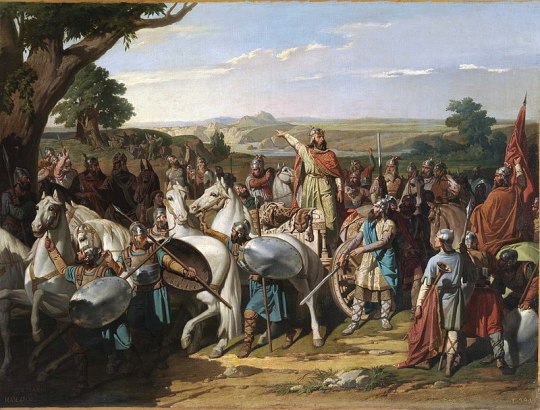
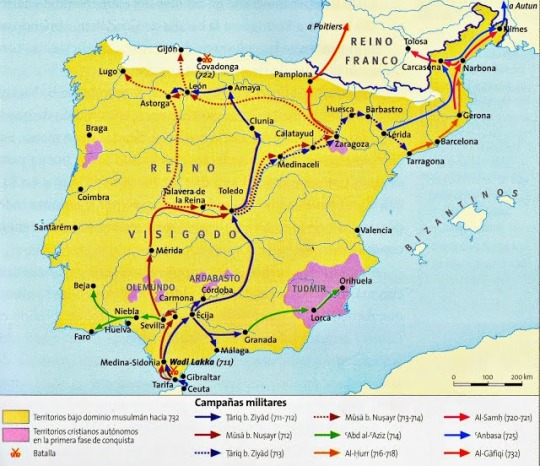
Apr.27?~29?.711 – Islamic conquest of Hispania: Moorish troops led by Tariq ibn Ziyad land at Gibraltar to begin their invasion of the Iberian Peninsula (Al-Andalus)
#Apr.27.711#Muslim conquest of Spain#Tariq ibn Ziyad#Gibraltar#Berbers#Moors#Early Muslim conquests#history today
2 notes
·
View notes
Text
This post is for the anon who sent me that video asking me to debunk it's claims so they can be better equipped against accusations of antisemitism.
Sorry, I won't post the video since I refuse to have that man on my blog but I can give you common Zionist talking points and the illogicality behind it.
To preface: most of the questions Zionists will ask you are a trap, and will make you fall into a "rabbit hole" (as I was once told when I was younger), as we try to apply their reasoning. My advice is to ALWAYS center the humanity of Palestinians. For example, when a Zionist says:
"Don't Jews deserve a homeland to be safe?"
It fundamentally ignores the core issue: Palestinians are being raped, murdered, and expelled from their homes so that the establishment of this so called "homeland" may exist. When people ask this to you, I personally advise saying something like:
Why must Palestinians suffer for the establishment of this homeland?
Always recenter to the issue at hand—the inhumane removal and treatment of Palestinians.
"Palestine belongs to the Jews and Not Muslims"
The whole premise of this claim is flawed—there is a weird tendency to equate Arab/Palestinian=Muslim when it just is like. Completely untrue. There are Palestinian Christians, Bethlehem is famously a Christian city, who have been there for centuries. There are Palestinian Jews, who have been there for centuries. There are Palestinian Muslims, who have been there for centuries. My grandpa told me stories of how he would turn on lamps for his Jewish neighbors in Al-Khalil (or Hebron) during Shabbat.
To claim that Palestine is EITHER Islamic or Jewish doesn't make any sense and completely neglects the fact that dissemination of culture has occurred for centuries, as well as the intermingling of people throughout generations. To somehow assert that for some reason, Jews and Muslims did not have ANYTHING to do with each other—did not create together, did not build families together, did not build culture together, all while being PALESTINIAN—is incredibly racist and nonsensical. "Palestinian" is not a religious identity—it's a cultural and ethnic one.
Also, it does not negate the core issue—Palestinians are being killed, removed, and tortured so that others can live on that land.
"Well what about [something about partitioning land]?"
Honestly like, who cares about the partitioning throughout the 1900 and early 2000s. Sorry, I'm not going to list the whole "partitioning" history nonsense. The whole reason "Israel" exists is because of a Mass Exodus, murder, and rape of Palestinians. Everything after that is rendered obsolete.
"Well, I heard Palestinians allied with Hitler"
I don't know how to tell you this but Palestine was under British Control. No they didn't.
"Israel withdrew from the Gaza and left them to themselves and they put Hammas in charge"
Oh yeah, Israel totally left Gaza, that's why Gazans' water, electricity, internet, and food is completely controlled by Israel (this is sarcasm, Israel still controls basic life in Gaza).
Go back to centering the idea that no human deserves to be shoved into an open-air prison, starved, and controlled. Did you know that the Zionist Entity controls the amount of water Gazans receive, as well as counting their calories to ensure they don't have enough energy on a day to day basis?
"I heard Israel asked Arabs to stay"
Show them these papers and videos when they say this:
youtube
If you can't show them these videos, check in the next point what to say.
"Well the Palestinians left of their own will in 1948"
Palestinians in 1948 didn't "leave." They had heard of how the Zionist Entity was slaughtering Palestinians en masse. Women especially heard stories of rape and sexual violence. They fled from *violence*. Again, from an earlier post, that this was a calculated effort on the Zionist Entity's part to try and get them to "leave" on their own and "abandon" their houses so that they can come in and say "hey, they left on their own so, we can come in and take their houses now."
Anyways, the idea that once you leave your house you can't ever come back to it is incredibly odd to me as an argument on Zionists' part. Like if you leave your house right now to go to the grocery store and you come back and see someone in your house and they're like "sorry dude, this is my house now, you left so that means you can't come back," you'd be like, "what the hell!" It would be even weirder if everyone agreed with the guy who took your house, which is what happened to Palestinians.
In Al-Khalil, or Hebron, Palestinians always have to have someone stay in their house or else a Settler will come in and take it from them. So it still goes on today as well.
This is not a point, but when that one person in the video said "Arabs lived under Israeli rule" and showed a clip of a bustling city with mountains, I'm pretty sure that was Amman, Jordan, not Palestine lol. Those buildings in the mountains look like how downtown Amman builds the residential areas. Could be wrong tho.
"There are no Jews living under Palestinian rule in Palestine"
What is this, some sort of gotcha argument? What are they trying to prove, the racist (obviously false) notion that Palestinians hate Jews as a whole? How do they know no Palestinian Jew lives in Gaza? Also, Settlers in Palestinian Territory exist??? I had never heard this claim before, its incredibly stupid lol. You're automatically a citizen of "Israel" if you're Jewish, whether or not you live in or outside of Palestinian Territories. So of course technically they don't live under Palestinian rule, they're granted full rights as an "Israeli" citizen automatically!
Go back to talking about the inhumane treatment of Palestinians, I wouldn't bring up the above counterpoint unless they really won't let it go since the main point is mistreatment.
"Why are Christians supporting Israel then, if it's a secular issue rather than a religious one?"
Well actually for a couple reasons:
Oil interests and regional control of goods (White People Supporting White People).
Weird fundamentalist ideology where they want to enact the second coming of Christ.
And finally because they are racist and don't think Arab Christians deserve to live. They literally bombed a 1500+ year church the other day. Why would (White) Christians cosign that.
Anyways, its a stupid argument again, because it forgets the core issue of Palestinians dying and being displaced.
In summary, always go back to the point of centering the Palestinians being displaced, tortured, and murdered, no matter the argument a Zionist gives you.
#palestine#gaza#info post#maybe i should do a masterpost with links to palestine education#maybe later#Youtube
6K notes
·
View notes
Text
Non-offensive Historical terms for Black people in historical fiction
@pleasespellchimerical asked:
So writing historical fiction, with a white POV character. I'm not sure how to address race in the narration. I do have a Black main character, and I feel like it'd feel out of place to have the narrator refer to her as 'Black', that being a more modern term. Not sure how to do this without dipping into common historical terms that are considered racist today. Thoughts on how to handle this delicately, not pull readers out of the narrative? (fwiw, the POV character has a lot of respect for the Black character. The narration should show this)
There are non-offensive terms you can use, even in historical fiction. We can absolutely refer to Black people without slurs, and if slurs is all one can come up with, it’s time to go back to the drawing board. I cannot say which terms are best for your piece without knowing the time period, but hopefully the list below helps.
Historical terms to use for Black people (non-offensive)
African American documented as early as 1782 (documented in an ad in the Pennsylvania Journal). Note the identity isn’t accurate for non-American Black people.
African could refer to African people or “from 1722 as ‘of or pertaining to black Americans.’”
The place of origin could also be used. For example, “a Nigerian woman”
Africo-American documented as early as 1788.
People of Color documented as early as 1796 (with specific contexts, usually mixed people)
Afro American documented as early as 1817, 1831 (depending on source)
Black American documented as early as 1831
Black was used in Old English to refer to dark-skinned people. Black was not capitalized until recent years, so “She was a young black woman.” would make sense to say, though “She was a young Black woman.” is the better standard today, although not universally adopted. I personally prefer it capitalized.
Moor was used as early as the late 1400s for North African people, but had a somewhat flexible use where anyone visibly Black / Of African descent or the Afro Diaspora might be referred to or assumed as a Moor. Note, it has other meanings too, such as referring to Muslim people, but that doesn’t mean the person using it is going by the dictionary definition. Not really the way to go today, but okay in a historical setting (in my opinion).
Biracial (1860s), mixed race (1872), multiracial (1903) and multicultural (1940s) are also terms to refer to people of two or more races.
Occupation + description. Throughout history, many people have been referred to as their occupation. For example, the Carpenter, The Baker, the Blacksmith. Here’s an example of how you might go about using occupation and traits to identify a Black character in history. Here’s an example I came up with on the fly.
“You should go by Jerry’s. He’s the best blacksmith this town’s ever seen. Ya know, the real tall, dark-skinned, curly haired fellow. Family’s come here from Liberia.”
Offensive and less-sensitive terms for Black people
Blacks was used in plural more, but this is generally offensive today (Even writing it gives me **Thee ick*)
Colored was mostly used post-civil war until the mid 20th century, when it became unacceptable. This is not to be conflated with the South African Coloured ethnic group.
Negro/Negroes were also used as early as the 1550s. Capitalization became common in the early 20th century. I'm sure you know it is offensive today, though, admittedly, was not generally seen as such until around the 1960s, when Black replaced it. It does have its contexts, such as the trope “The Magical Negro” but going around using the term or calling someone that today is a lot different.
Mulatto referred to mixed people, generally Black and white, and is offensive today.
The N-word, in all its forms, is explicitly a slur, and there is absolutely no need to use it, especially in a casual manner, in your story. We’ve written about handling the N-word and alluding to it “if need be” but there are other ways to show racism and tension without dropping the word willy-nilly.
Deciding what to use, a modern perspective
I’m in favor of authors relying on the less offensive, more acceptable terms. Particularly, authors outside of the race. Seldom use the offensive terms except from actual direct quotes.
You do not have to use those offensive terms or could at least avoid using them in excess. I know quite famous stories do, but that doesn’t mean we have to so eagerly go that route today. Honestly, from teachers to school, and fellow non-Black students, it’s the modern day glee that people seem to get when they “get a chance to say it” that makes it worse and also makes me not want to give people the chance.
It goes back to historical accuracy only counting the most for an “authentic experience” when it means being able to use offensive terms or exclude BIPOC from stories. We’ve got to ask ourselves why we want to plaster certain words everywhere for the sake of accuracy when there are other just as accurate, acceptable words to use that hurt less people.
Disclaimer: Opinions may vary on these matters. But just because someone from the group cosigns something by stating they’re not offended by it, doesn’t mean a whole lot of others are okay with it and their perspectives are now invalid! Also, of course, how one handles the use of these words as a Black person has a different connotation and freedom on how they use them.
~Mod Colette
The colonial context
Since no country was mentioned, I’m going to add a bit about the vocabulary surrounding Black people during slavery, especially in the Caribbean. Although, Colette adds, if your Black characters are slaves, this begs the question why we always gotta be slaves.
At the time, there were words used to describe people based on the percentage of Black blood they had. Those are words you may find during your searches but I advise you not to use them. As you will realize if you dive a bit into this system, it looks like a classifying table. At the time, people were trying to lighten their descent and those words were used for some as a sort of rank. Louisiana being French for a time, those expressions were also seen there until the end of the 19th century.
The fractions I use were the number of Black ancestors someone had to have to be called accordingly.
Short-list here :
½ : mûlatre or mulatto
¼ or ⅛ : quarteron or métis (depending on the island, I’m thinking about Saint-Domingue, Martinique and Guadeloupe)
1/16 : mamelouk
¾ : griffe or capre
⅞ : sacatra
In Saint-Domingue, it could go down to 1/64, where people were considered sang-mêlé (mixed blood for literal translation, but “HP and the Half-Blood Prince” is translated “HP et le Prince de Sang-Mêlé” in French, so I guess this is another translation possibility).
-Lydie
Use the 3rd person narrative to your advantage
If you are intent on illustrating historical changes in terminology consider something as simple as showing the contrast between using “black” for first person character narration, but “Black” for 3rd person narrator omniscient.
-Marika
Add a disclaimer
I liked how this was addressed in the new American Girl books
it’s set in Harlem in the 1920’s and there’s a paragraph at the beginning that says “this book uses the common language of the time period and it’s not appropriate to use now”
-SK
More reading:
NYT: Use of ‘African-American’ Dates to Nation’s Early Days
The Etymology dictionary - great resource for historical fiction
Wikipedia: Person of Color
2K notes
·
View notes
Text
youtube
#Early Muslim Invasions In India Part 1 | History For TSPSC/APPSC/UPSC | Tone Academy | Srinivasa Rao#This video details about the early muslim invasions in India.#musliminvasions#earlymusliminvasions#tspsc#history#indiahistoryofindia#toneacademy#telanganastatepublicservicecommission#historyforupsc#Youtube
0 notes
Text
Western alchemical texts often resembled mystical riddles. Now, we all love some mystical books of alchemical riddles, it’s half the fun of early alchemy, but Arabic alchemical works are written more like teaching materials. This is because they were often used as teaching materials. Where earlier alchemists needed to encode their works as a form of proto-copyright, Islamic alchemists were trying to efficiently collect and distribute information. Though be warned, “easier to read” by the standards of medieval alchemists is still pretty dense. Hope you like neoplatonism, because in terms of density, Islamic alchemy is a neoplatonic pound cake, with nuts. (The nuts are hermeticism in this metaphor.)
“But who cares?” I hear you ask “Isn’t this supposed to be a book about magic? Why are we talking about these dead Arab philosophers?” Remember, dear reader, that some of the first esotericists in western history were Plato and Aristotle, but their ideas didn’t mesh all that well.
Many a wizard-philosopher tried and failed to glue them together. Most failed. Some resorted to pretending to be Aristotle, publishing books under his name. For the Byzantines, the idea of reconciling Plato and Aristotle was almost laughable. The neoplatonists said they could do it, but few took them seriously.
By the time the Baghdad House of Wisdom, neoplatonism had time to mature. For the Muslims, it was damn near philosophy 101. The idea that Plato and Aristotle conflicted at all was laughable. “What do you mean Plato and Aristotle don’t fit together? Everyone knows they fit together.” And thus, one of the greatest roadblocks to early magic was smoothed over. The twin cities of early magic were separated by a river, the neoplatonists would cross it, and the Baghdad House of Wisdom would build a bridge.
Islamic Alchemy, today on da Patreon
1K notes
·
View notes
Text
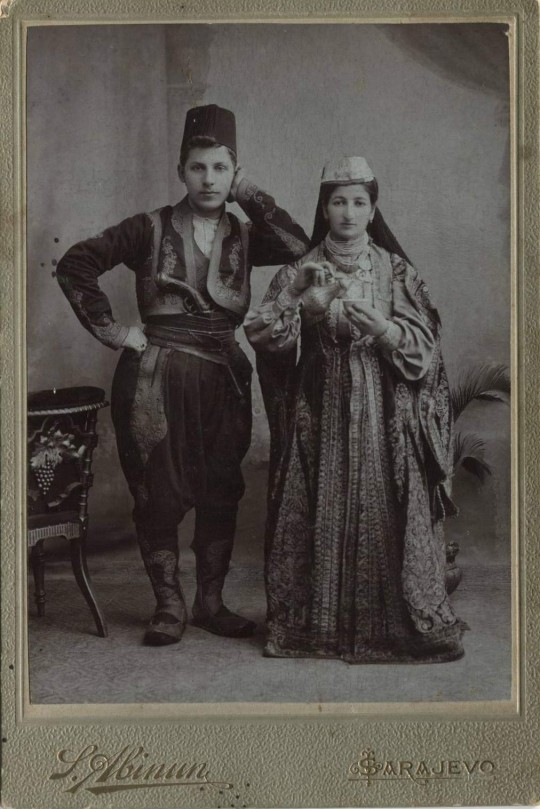
Jewish (Sephardic) couple from Sarajevo, Bosnia and Herzegovina, 1910
The first Jews came to Sarajevo, later called "Little Jerusalem", from the Iberian Peninsula in the early 16th century, bringing with them the Ladino language and Sephardi customs. A prosperous Jewish quarter with a synagogue was erected in 1577 under the pasha Siavush. Known to the Bosnians as tchifut-khan, the Jews themselves called it El Cortijo (the communal yard). Making up more than 20% of Sarajevo' total population, they maintained excellent relations with their Bosnian Christian and Muslim neighbors and held renowned positions as merchants, weavers, tailors, blacksmiths and hatchims (from the Arabic-Turkish Hakīm, "doctor"). With the Holocaust, this rich Jewish life and history tragically came to an end.
729 notes
·
View notes
Note
Hey Sal! I was wondering if you'd mind sharing your opinion on non-Muslims using phrases like "Inshallah" and "Alhamdulillah"?
For context, I'm white and ex-Catholic. One of my best friends growing up was Muslim — she and her family immigrated to my town as refugees from Afghanistan in the early 00s. They always encouraged me to learn and participate in their family gatherings, and "Inshallah" and "Alhamdulillah" became a normal part of my own lexicon. It cemented further during college, as I had classes on Middle East history where my professor started each class with call and response salaams, and encouraged us to learn and use basic Arabic together in class. So, I tend to use these phrases in day to day conversations the way I would other non English phrases, such as "c'est la vie" or "un poco".
However, I realized that while salaams may be welcomed for non-Muslims to use, phrases like "Inshallah" and "Alhamdulillah" may feel inappropriate or appropriative coming from myself with no other context. Would it be better for non-Muslims like myself to refrain from using phrases like these? Or am I overthinking this?
Love and appreciate you and all you do to have open dialogues to educate your followers :) Thank you!

423 notes
·
View notes
Text
youtube
#Umar ibn al-Khattab#Rise of Islam#Islamic history#Muslim conquests#Caliph Umar#Early Islamic leaders#Umar's legacy#Conquest of Jerusalem#Battle of Yarmuk#Islamic administration#Religious tolerance in Islam#Economic impact of conquests#Umar's leadership#Islamic expansion#Historical series#Early Muslim state#Umar's successors#Islamic governance#Islamic conquests#Historical documentaries#muslim#islam#companions of the prophet#sahabah#lost islamic history#Youtube
1 note
·
View note
Text
Arnesa Buljušmić-Kustura knows the makings of a genocide when she sees it. Not only is she a genocide researcher and educator, but she also herself lived through the siege on Sarajevo during the Bosnian War in the early 1990s. Tens of thousands of Bosnian civilians were killed, tens of thousands more women were raped, and millions of Bosnian Muslims were uprooted in an ethnic cleansing campaign. Another 8,000 Bosniak Muslim boys and men were slaughtered in Srebrenica during Europe’s only recognized genocide since World War II.
The parallels between the siege on Gaza and the systematic violence that stole her grandmother, grandfather and uncle in Sarajevo, Visegrad and Srebrenica haunt her.
“Everything to me reeks of genocide,” she says. “It’s the genocidal rhetoric. It’s the objectification. It’s the dehumanization. It’s the occupation.”
Buljušmić-Kustura, 36, has dedicated her life to ensuring that another generation is never forced to face the same horrors she did. But as the death toll from Israel’s endless indiscriminate bombings on Gazan civilians pushes higher and higher, she feels history repeating itself.
“They are showing us the bombings, they are showing us the destruction, the dead, the children and women being pulled out of rubble … of the bombardment, of what it means to live without electricity, food, water and aid,” she says.
As Israel enacts communication blackouts that obscure the extent of the continued massacre, Buljušmić-Kustura has a stark warning: “We cannot stay silent. Otherwise, we’re going to wake up one day to see an entire ethnic group completely annihilated, and we will all be responsible for it.”
552 notes
·
View notes
Text
There are fifth-century inscriptions in Greek and Syriac dedicating the site to Salome, a woman who assisted at the birth of Jesus according to the traditions of Eastern Orthodox Christianity.
Then some 200 years after the Muslim conquest of the region. To read about a mosque and other Islamic-style buildings unearthed in Israel's Negev Desert, go to "Side by Side."
#history#archeology#archeologicalsite#discovery#early christianity#orthodox christianity#muslim#mosques#pilgrimage#israel
3 notes
·
View notes
Text
Abu al-Faraj al-Isfahani’s Kitab al-Aghani records the lives of a number of individuals including one named Tuways who lived during the last years of Muhammad and the reigns of the early Muslim dynasties. Tuways was mukhannathun: those who were born as men, but who presented as female. They are described by al-Isfahani as wearing bangles, decorating their hands with henna, and wearing feminine clothing. One mukhannathun, Hit, was even in the household of the Prophet Muhammad.
Tuways earned a reputation as a musician, performing for clients and even for Muslim rulers. When Yahya ibn al-Hakam was appointed as governor, Tuways joined in the celebration wearing ostentatious garb and cosmetics. When asked by the governor if he were Muslim Tuways affirmed his belief, proclaiming the declaration of faith and saying that he observes the fast of Ramadan and the five daily prayers. In other words, al-Isfahani, who recorded the life of a number of mukhannathun like Tuways, saw no contradiction between his gender expression and his Muslimness. From al-Isfahani we read of al-Dalal, ibn Surayj, and al-Gharid—all mukhannathun—who lived rich lives in early Muslim societies. Notably absent from al-Isfahani’s records is any state-sanctioned persecution. Instead, the mukhannathun are an accepted part of society.
...
Far from isolated cases, across Islamic history—from North Africa to South Asia—we see widespread acceptance of gender nonconforming and queer individuals.
- Later in the Ottoman Empire, there were the köçek who were men who wore women’s clothing and performed at festivals. Formally trained in dance and percussion instruments, the köçek were an important part of social functions. A similar practice was found in Egypt. The khawal were male dancers who presented as female, wearing dresses, make up, and henna. Like their Ottoman counterparts, they performed at social events.
- In South Asia, the hijra were and are third-sex individuals. The term is used for intersex people as well as transgender women. Hijra are attested to among the earliest Muslim societies of South Asia where, according to Nalini Iyer, they were often guardians of the household and even held office as advisors.
- In Iraq, the mustarjil are born female, but present as men. In Wilfred Thesiger’s The Marsh Arabs the guide, Amara explains, “A mustarjil is born a woman. She cannot help that; but she has the heart of a man, so she lives like a man.” When asked if the mustarjil are accepted, Amara replies “Certainly. We eat with her and she may sit in the mudhif.” Amara goes on to describe how mustarjil have sex with women.
...
Historian Indira Gesink analyzed 41 medical and juristic sources between the 8th and 18th centuries and discovered that the discourse of a “binary sex” was an anachronistic projection backwards. Gesink points out in one of the earliest lexicography by the 8th century al-Khalil ibn Ahmad that he suggests addressing a male-presenting intersex person as ya khunathu and a female-presenting intersex person as ya khanathi while addressing an effeminate man as ya khunathatu. This suggests a clear recognition of a spectrum of sex and gender expression and a desire to address someone respectfully based on how they presented.
Tolerance of gender ambiguity and non-conformity in Islamic cultures went hand-in-hand with broader acceptance of homoeroticism. Texts like Ali ibn Nasir al-Katib’s Jawami al-Ladhdha, Abu al-Faraj al-Isfahani’s Kitab al-Aghani, and the Tunisian, Ahmad al-Tifashi’s Nuz’ha al-‘Albab attest to the widespread acceptance of same-sex desire as natural. Homoeroticism is a common element in much of Persian and Arabic poetry where youthful males are often the object of desire. From Abu Nuwas to Rumi, from ibn Ammar to Amir Khusraw, some of the Islamic world’s greatest poets were composing verses for their male lovers. Queer love was openly vaunted by poets. One, Ibn Nasr, immortalizes the love between two Arab lesbians Hind al Nu’man and al-Zarqa by writing:
“Oh Hind, you are truer to your word than men.
Oh, the differences between your loyalty and theirs.”
...
Acceptance of same-sex desire and gender non-conformity was the hallmark of Islamic societies to such a degree that European travelers consistently remarked derisively on it. In the 19th century, Edward Lane wrote of the khawal:
“They are Muslims and natives of Egypt. As they personate women, their dances are exactly of the same description as those of the ghawazee; and are, in like manner, accompanied by the sound of castanets.”
A similarly scandalized CS Sonnini writes of Muslim homoerotic culture:
“The inconceivable appetite which dishonored the Greeks and the Persians of antiquity, constitute the delight, or to use a juster term, the infamy of the Egyptians. It is not for women that their ditties are composed: it is not on them that tender caresses are lavished; far different objects inflame them.”
In his travels in the 19th century, James Silk Buckingham encounters an Afghan dervish shedding tears for parting with his male lover. The dervish, Ismael, is astonished to find how rare same-sex love was in Europe. Buckingham reports the deep love between Ismael and his lover quoting, “though they were still two bodies, they became one soul.”
...
Today, vocal Muslim critics of LGBTQ+ rights often accuse gay and queer people of imposing a “Western” concept or forcing Islam to adjust to “Western values” failing to grasp the irony of the claim: the shift in the 19th and 20th century was precisely an alignment with colonial values over older Islamic ones, all of which led to legal criminalization. In fact, the common feature among nations with anti-LGBTQ+ legislation isn’t Islam, but rather colonial law.
Don't talk to me I'm weeping. I'm not Muslim, but the grief of colonization runs in the blood of every Global South person. Dicovering these is like finding our lost treasures among plundered ruins.
Queer folk have always, always been here; we have always been inextricable, shining golden threads in the tapestry of human history. To erase and condemn us is to continue using the scalpel of colonizers in the mutilation and betrayal of our own heritage.
#islam#queer muslims#queer history#lgbt history#colonization#colonialism#imperialism#world history#trans positivity#gay positivity#intersex positivity#queer poetry#queer love#queer art#islamic culture#lgbtqia#islamic history#global south#pinkwashing#islamphobia#colonial violence#queer erasure#arab culture#ottoman empire#hijra#wlw#mlm#knee of huss#same sex love#egyptian culture
621 notes
·
View notes
Text
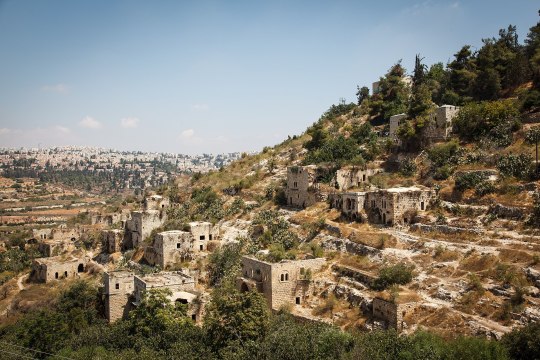
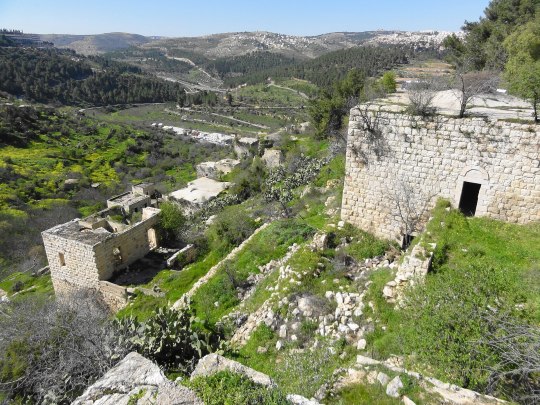
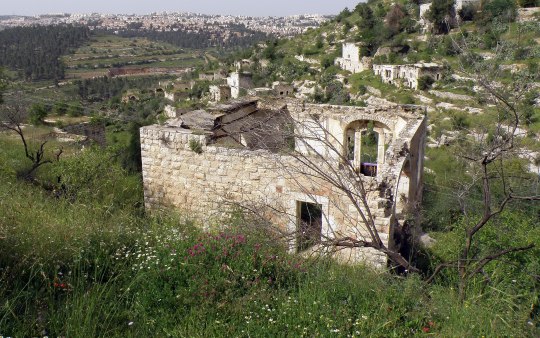
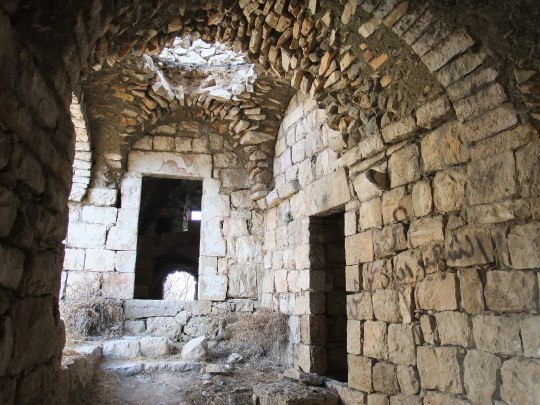
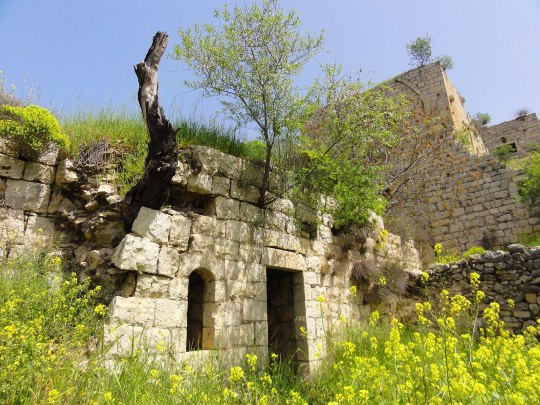
when the homes in the depopulated palestinian village of lifta were originally built is impossible to tell and most likely varies from house to house. the area's been known since ancient times, including having been written about in the hebrew bible. it's retained multiple different names throughout history - lifta by romans, nephto by byzantines, clepsta by crusaders, then lifta again by arabs. in more recent times, the area saw battle in the early 19th century, when it saw a peasant's revolt against egyptian conscription and taxation policies. (egyptian-ottoman ruler muhammad ali had attempted to become independent from the ottoman empire, and sought to use the area of "greater syria" which palestine was apart of as a buffer state.)
the village was predominantly muslim with a mosque, a maqām for local sage shaykh badr, a few shops, a social club, two coffee houses, and an elementary school which opened in 1945. its economy was based in farming - being a village of jerusalem, farmers would sell their produce in the city's markets. an olive press which remains in the village gives evidence to one of the most important crops its residents farmed. the historically wealthy village was known for its intricate embroidery and sewing, particularly of thob ghabani bridal dresses, which attracted buyers from across the levant.
lifta also represents one of the few palestinian villages in which the structures weren't totally or mostly decimated during the 1948 nakba. 60 of the 450 original houses remain intact. from zochrot's entry on lifta:

israel's absentee property law of 1950 permits the state to expropriate land and assets left behind, and denies palestinians the right to return to old homes or to reclaim their property. it's estimated that there's around 400,000 descendants of the village's original refugee population dispersed in east jerusalem, the west bank, jordan, and the palestinian diaspora.
like many depopulated palestinian houses, some of those in lifta were initially used to settle predominantly mizrahi immigrants and refugees, in this case 300 jewish families from yemen and kurdistan. the houses weren't registered in their names, and the area generally saw poor infrastructure and no resources including water and electricity provided by the government. most left in the early 1970s as a part of a compensation program to move out people who'd been settled in depopulated palestinian houses - if they didn't, they were referred to as "squatters" and evicted. (holes were even drilled in the roofs of evacuated buildings to make them less habitable). the 13 families which remain there today only managed to do so because they lived close to the edge of the village.
in 1987, the israeli nature reserves authority planned to restore the "long-abandoned village" and turn it into a natural history center which would "stress the jewish roots of the site", but nothing came of it. several more government proposals on what to do with the land had been brought up since then. this culminated in in 2021 when the israel land administration announced without informing the jerusalem municipal authorities that it issued a tender for the construction of a luxury neighborhood on the village's ruins, consisting of 259 villas, a hotel, and a mall. since 2023, they've agreed to shelve and "rethink" these plans after widespread objection.
the reasons for the objections varied significantly between the opposing israeli politicians - who see the village as an exemplar of cultural heritage and "frozen in time" model of palestinian villages before 1948 - and palestinians - who largely see the village as a witness of the nakba and a symbol of hope for their return. lifta is currently listed by unesco as a potential world heritage site, a designation netanyahu has threatened to remove several times.
many palestinians who are descendent from its former residents still live nearby. like with many other depopulated palestinian villages, they've never ceased to visit, organize tours of the village, and advocate for its preservation.
#palestine#info#nakba#my posts#the dresses link isnt specific to lifta thobs but provides a good overview#i couldn't find anything online abt lifta's embroidery but some of the book pdfs on palestinian costume i reblogged a while ago have info
381 notes
·
View notes